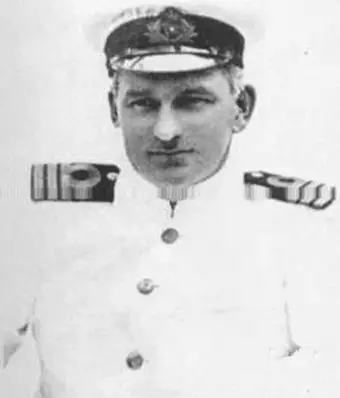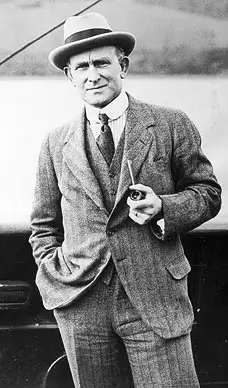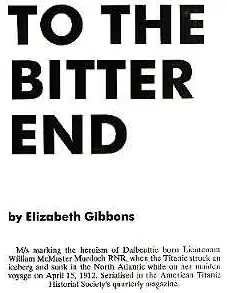12. The Reshuffle
Olympic left without three of her customary crew. Chief Purser McElroy, Surgeon O'Laughlin, and Chief Officer Henry Wilde had been asked to transfer to the Titanic; all would perish, and two at least, Dr. O'Laughlin and Officer Wilde, very much did not want to make the change. Wilde had been requested by Captain Smith; in the 1950s surviving friends of Wilde told Geoffrey Marcus, author of The Maiden Voyage, that Wilde was only talked into accepting the last minute assignment by their insistence that this was a brilliant opportunity not to be declined. Wilde was evidently preparing for his own captaincy, but there was something much more serious than pique in his disquiet. Why Henry Wilde did not wish to serve as Chief Officer on the Titanic is not known.

Wilde in his summer uniform aboard the Olympic c.1911.
White Star would later insist that Smith wanted Wilde because of the later's experience with the giant liners, an explanation which explains nothing because it does not address the question of why Smith felt two experienced senior officers (Wilde and Murdoch) were obligatory for Titanic, when Haddock had just taken Olympic to sea with no experienced officer available except her Second Officer. The explanation has been proffered that Smith was going to take Titanic on the shorter northern route, the intention being to bring her into New York in the shortest time possible for a maiden voyage record, and preferred to have his two trusted officers from Olympic taking the night watches, when the risk was greatest. As Smith, unlike Haddock, did not insist upon extra coal, then either Smith did intend to go as far north as he judged safe, or he anticipated (correctly, as it happened) that severe weather was unlikely in mid April.
Wilde's appointment as Chief Officer caused a reshuffle among Titanic's senior officers. Murdoch and Lightoller stepped back to First and Second respectively, and Second Officer Davy Blair went ashore. Lightoller later implied that the change was effected soon after Titanic's arrival at Southampton in the early hours of April 3, 1912; Murdoch, however, indicated in a letter to his sister written on Easter Monday, April 8th, that it was to take effect on sailing day; as the contemporary version, this is more likely. The result was that on April 10th the exasperation of exchanging duties, watches and cabins at the last moment was added to the turmoil of embarkation.
Lightoller's resentment at this demotion is palpable to anyone reading his memoirs; evidently blaming Wilde, his dislike for the man went straight through the grave and kept on going, and in 1935 was as fresh as the April day when Henry Wilde caused Charles Lightoller to lose rank. Murdoch's reaction was more subtle, and more substantial. In the April 8, 1912, letter to Margaret Murdoch from Southampton, Murdoch wrote:
I am still Chief Offr until sailing day & then it looks as though I will have to step back, but I am hoping that it will not be for long. The head Marine Supt. from L'pool seemed to be very favourably impressed & satisfied that everything went on A I & as much as promised that when Wilde goes then I am to go up again.
This particular decision not only displeased Murdoch, but unsettled him. In light of the private pledge that he would have the next vacant captaincy, he may have felt that for some reason unstated the promised command was jeopardized, or given White Star's history of ruthlessness toward its employees was worried that the change in Chief Officers reflected on him personally. Despite whatever assurances he had received from the chief Marine Superintendent, Murdoch was sufficiently concerned to confide in Thomas Andrews, evidently when Titanic was already at sea; since neither party to this private conference survived it is likely that Murdoch repeating the conversation to a third party (probably Lightoller) accounts for knowledge that it occurred.
The sudden demotion also meant a decrease in salary, from L25 back to L17. Murdoch was in no urgent need of money, would in fact leave his wife a respectable sum -- a spendthrift Scot is an oxymoron -- but the loss of an L8 raise to a married man with household expenses and a mortgage is no happy event at any time. It was particularly unwelcome in 1912, an age of iniquitous inflation and static wages that would last until the outbreak of the Great War.
Murdoch's apprehension went deep, and became one more intangible factor in Titanic's journey; it was exactly the sort of internal distraction that involuntarily intrudes in moments of familiar, tedious routine.

Titanic's original Second Officer
David 'Davy' Blair.
The confusion engendered in the crew by Wilde's last ditch arrival can be seen in their Senate Hearing testimony; most went on addressing Murdoch as Chief Officer, and others used both Chief and First, occasionally in the same sentence. Able seaman George McGough invented his own title for William Murdoch, "junior chief".
The last moment rearrangement of officers had a result in addition to providing Captain Smith with three deck officers each discomfited in his own way. Prior to disembarking, Davy Blair had decided that the lookouts' binoculars might be misappropriated from the crow's nest in the general confusion and for safety had removed them. He forgot to tell anyone he had done so. Lookout Hogg, on duty for departure, discovered them missing while still in Southampton, and reported the matter immediately to Lightoller; the loss was a matter of indignation among the six lookouts, including Frederick Fleet, the man who would sight the iceberg. Lightoller in the American Inquiry made light of the need for binoculars, asserting that they were either redundant or a hindrance, while Fleet testified that if he had had binoculars he would have seen the iceberg in time to miss it. Both opinions were intended mostly to divert censure, but illuminated the desperate haste surrounding sailing day; neither Lightoller nor anyone else had time either to try to locate the missing binoculars or to send ashore for a replacement.
There were three pair of binoculars on the bridge, one each for the commander and the officer of the watch and another for use by the pilot, but not giving one to the lookouts once the pilot had gone had a different reason: handing up the spare once at sea occurred to no one because to do so would be outside custom. For this one voyage, the lookouts, despite vigorous protest, were told to make due with unaided eyesight.
Blair was not the only officer disposing of ship's property without advising anyone. Lightoller while still First Officer had duly received the company's most ominous equipment: seven revolvers. Almost certainly, these were standard British officer issue .45 caliber Webleys, and came, in Lightoller's sarcastic phrase, "in all their pristine grease". Guns on merchant vessels were one of his objects of derision, and he promptly stored them in an inaccessible cupboard in the cabin he then turned over to Murdoch upon sailing. The revolvers joined the lookouts' binoculars as a victim of muddle; this time it would be Murdoch who could not locate something when needed. The guns should have come with two indispensable items: holsters and lanyards. Lightoller does not mention them.
